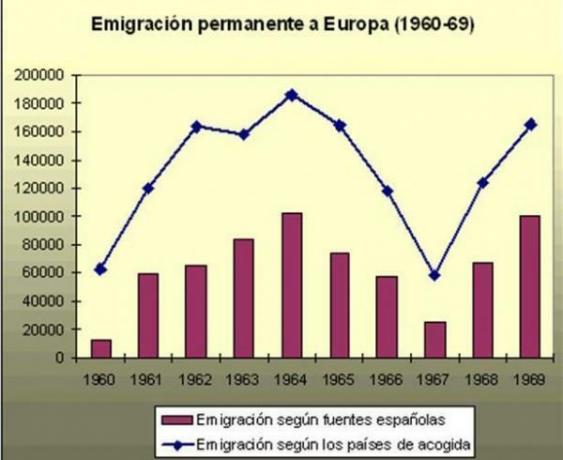Spanish emigration in the 1960s: causes and history

In the 1960s, a great emigration of Spaniards took place to other countries, especially to other European countries such as Germany or France. This fact was very important for the history of Spain, being of a great social mark for the time. Due to the importance of this period, today in this lesson from a TEACHER we are going to talk about the causes and history of Spanish emigration in the 1960s.
There were several causes that led to the Spanish emigration, being the majority of economic character, in which the Spanish were looking for a better life outside the Hispanic country. The causes that caused more than 2 million Spaniards to leave can be divided into two, internal and external causes.
Internal causes
Some of these internal causes are as follows:
- It began to mechanize agriculture, using more machinery, and therefore reducing the workforce and increasing unemployment of those people who were engaged in the agricultural sector.
- There was a Rural exodus, people left the towns due to lack of work, and they went to the cities. This caused a lack of work in the city, due to the large increase in the population in these areas.
- The economy of Franco's Spain was of subsistence, which did not favor the industrial sector. The industry was not capable of employing all the people who lived in the cities, not even with the opening to the foreign market.
- The government used the assisted emigration to try to stop the growing unemployment in the country. Causing the march of many Spaniards towards a Europe with much more employment.
External causes
On the other hand we can find the external causes, the reasons that other countries gave for the Spanish to leave. Some of these external causes are the following:
- The north Europe was having a big economic increase and there was not enough manpower as to be able to occupy all the existing jobs.
- The economy and industrial production it increased to extraordinary limits, especially the plastics and automobile industries.
- In most of Europe there was a aging population, with a small number of people who could start working each year.
- People were needed to fill the jobs with less qualification they needed, since the most important and difficult positions were occupied by the inhabitants of European countries.
- European countries that were economically strong agreed agreements with Spain, creating contracts to fill the vacant positions. Thanks to this, the Hispanic country could reduce the level of unemployment in the country, and strengthen ties with other European states.

Image: Geography blog - Professor Pedro Oña
To continue with this lesson on Spanish emigration in the 1960s, we are going to discuss the different consequences of this stage.
The Spanish emigration caused numerous consequences, both immediate and some that did not have consequences until many years later. The consequences were of a very different nature, such as economic, social, or demographic.
Demographic consequences
One of the most important consequences for Spain was demographic. Population growth in the 1960s was 10%, which would have been much higher if it weren't for all those Spaniards who left the country.
Most of the emigrants were men of working age, which changed society, modifying the proportion between both genders, and increasing that part of society that was not of working age, that is, minors and retirees. Even so, emigration did not serve to improve unemployment, which increased throughout the decade even with the departure of the Spanish.
Economical
The consequences were also economic. The country's economy improved with money that came from other countries for sending Spanish labor. These payments served, among other things, to improve the country's industry, and to be able to approach the industrial power of other European countries.
The problem was how the money that came from Europe was used, since the economy of the most important areas was improved. industrial companies in the country, instead of sending this money to regions where there were major problems economic.
Social consequences
Finally, there are the social consequences derived from emigration. The emigrants did not feel well either in Spain or in the country of origin, and in the receiving countries they carried out the hardest jobs, suffering years of great hardship.
The return of the emigrants to Spain was also hard, as a result of which society suffered great changes, such as the lower wages or increased unemployment.
If you want to read more articles similar to Spanish emigration in the 1960s: causes and history, we recommend that you enter our category of Story.



